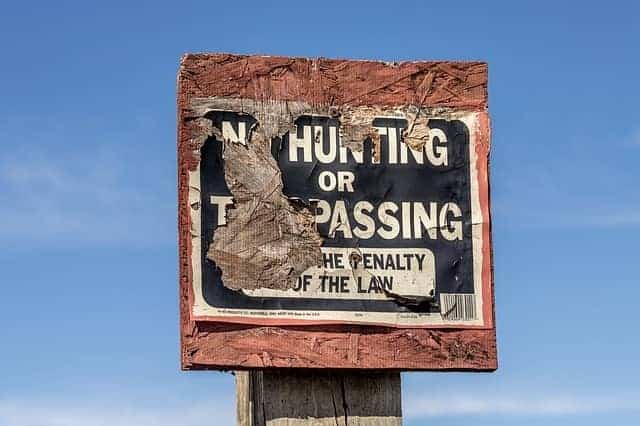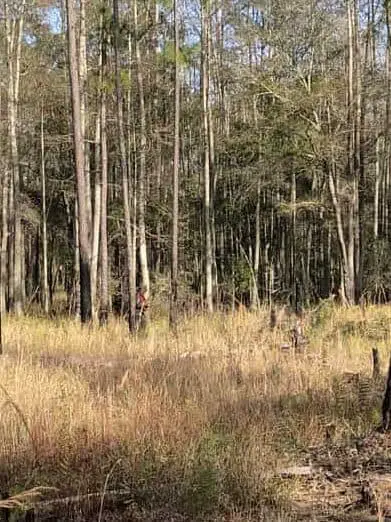When it comes to game wardens and their authority in nature and on private property, understanding exactly what they can, and can’t do, is very important. If you own land near a wooded area, you should be asking if a game warden can come on private property.
A game warden can come on private property without permission and without a warrant. Though in most cases, they do not act any differently than police officers except for the environment they are in. One of the biggest exceptions is how they act relating to the Fourth Amendment.
Game wardens and their relationship with private property can be very confusing. Read on to learn more about what the open field doctrine is, how it relates to game wardens, and exactly what they can do.

Table of Contents
- Can A Game Warden Go On Private Property?
- Can A Game Warden Search You Without A Warrant?
- Can A Game Warden Search Your Car?
- Can A Game Warden Search Your House?
- Can A Game Warden Take Your Gun?
- Open Field Doctrine Explained
Can A Game Warden Go On Private Property?
While it is true that a game warden can search you and your vehicle, what about private property? Generally, if there is a “Private Property” or “No Trespassing” sign, people are not allowed to come onto your land. Does this apply to game wardens?
A game warden can go on private property even if there is a posted sign. If you own a large swath of land, say three acres, the only areas under protection from a warrantless search are your home, porch, and potentially your driveway. Everything else is fair game for a search with probable cause.
This is for one of two reasons.
The first is, these exterior parts of your property do not have the same expectation of privacy. When I go and stand in the middle of a field, even if I own it, I don’t have the same expectation of privacy as I do somewhere else.
For this reason, the open field doctrine applies, even if it is your own property.
The other reason game wardens have the authority to enter private property is because nature does not observe property limits. A deer is just as likely to be in a national park as it is in my field.
Game wardens, who are tasked with enforcing our conservation laws, need to have the authority to enter private lands to do their job effectively.
Can A Game Warden Search You Without A Warrant?
Now that we have some understanding of the Fourth Amendment, warrants, and the open field doctrine, we can begin to apply it to certain scenarios. For example, could a game warden search you without a warrant?
A game warden cannot search you without a warrant if you are out in the open field. Though most of the time, a game warden will not conduct a search of your person randomly. However, if they suspect you of violating the law, it is within their power to search you.
In most cases, a game warden, or any law enforcement officer, will ask you if they have your consent to search your person. If granted, you are waiving your Fourth Amendment right in this scenario, allowing them to conduct a search.
Generally, the rule of thumb that game wardens apply is by asking themselves two questions:
- Is there a reasonable expectation of privacy?
- Is there probable cause?
In nature, however, these rules are a little bit different. In Hester v. US the court said that in these undeveloped and open spaces, the expectation of privacy no longer remains. For this reason, an officer could search you in the open field.
Can A Game Warden Search Your Car?
When it comes to whether a game warden can search your car or boat, things become a little bit more difficult. While your car may not necessarily be your home, many people argue that what is in your car is more private than just what is in an open field. So, could a game warden search your car?
If a game warden has probable cause, they can search your car without a warrant. This is true in most scenarios, but especially true if your car is out in nature. In these instances, your car is in the “open field” so the expectation of privacy is reduced.
If a game warden believes that they have a reasonable suspicion that searching your car would lead to evidence of a crime, they are allowed to do so.
Like many things in policing, the standard the warden must meet is whether or not an “objectively reasonable” and “prudent” person would believe the vehicle may contain evidence of a crime. If so, then a search, without a warrant, is permitted.
The other important thing to note is that police have the power to search any abandoned vehicle without probable cause. If you leave your truck in the middle of the woods where there are no roads, this might be considered abandoned, and nothing would be needed to allow someone to search the vehicle.
Can A Game Warden Search Your House?
While it seems like game wardens, and police in general, have pretty large discretion under the open field doctrine to conduct searches and make arrests, what does this mean for you in your home? Can a game warden search your house?
A game warden cannot search your home without a warrant. When you are within your own home, you have the highest expectation of privacy. Both law enforcement officers and game wardens must honor this expectation and need the warrant to search your home.
Police and game wardens can search your home, however, if you give them consent.
It is important to note that you are not required to give law enforcement officers consent to search your home. If officers do present a warrant, you are required to allow them to enter and search your home.
Warrants, however, do not give them complete authority to search everything. If they are granted a warrant to search your car, for example, they can not use it to search your home as well.
Can A Game Warden Take Your Gun?
Law enforcement officers, including game wardens, have the ability to arrest people and, if necessary, use force to keep themselves and others safe. Does this mean that a game warden can take your gun?

A game warden can take your gun in certain instances, but not without reason. If you commit a crime or are threatening violence against someone, including yourself, they may seize your firearm.
In some instances and states, law enforcement officers are required to confiscate your gun. This varies from state to state, but you can contact your local police department to find more about these powers.
Open Field Doctrine Explained
When the United States was founded, it originally had a loose federal government referred to as the Articles of Confederation. These articles limited the power of the federal government, so much so that everyone from farmers to bankers hated the rules.
In 1787, the Founding Fathers quickly decided that these rules were not usable in the future, and called for the Constitutional Convention. Here, the founders made the Constitution that would ultimately run the government.
Some of the founders, however, were skeptical of this constitution.
They felt that it did not do enough to protect the individual rights of people, and refused to adopt it unless these rights were listed somewhere. As a result, the founders passed the first ten amendments to the Constitution known as the Bill of Rights.
In this document, they listed a number of rights to prevent tyranny.
This included the Fourth Amendment which protected against “unreasonable searches and seizures”. This made the requirement that police have a warrant before searching your property. In 1924, a major case called Hester v. US came before the Supreme Court about these Fourth Amendment protections.
Here, the court decided that it was not reasonable or legitimate to expect privacy in an “open field”.
In doing so, the court created what we now call the “open field doctrine”. This makes it so that, in any unoccupied or undeveloped area outside of one’s home and immediate surroundings, Fourth Amendment protections did not apply.
For game wardens, most of their work occurs in these “open fields”, allowing them more power to work beyond the protections of the Fourth Amendment.





